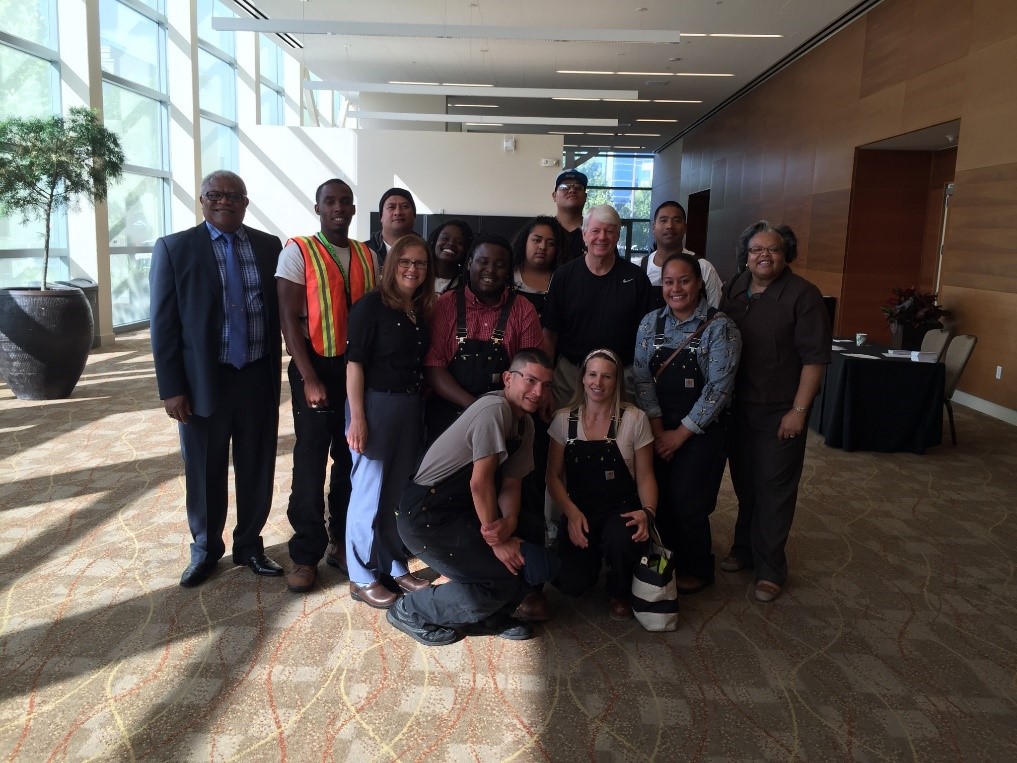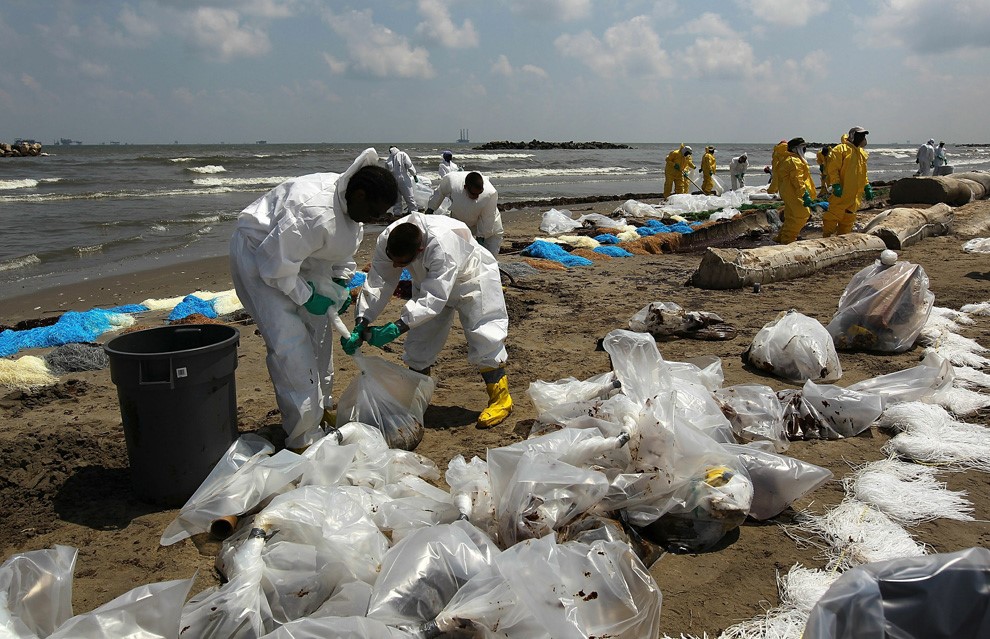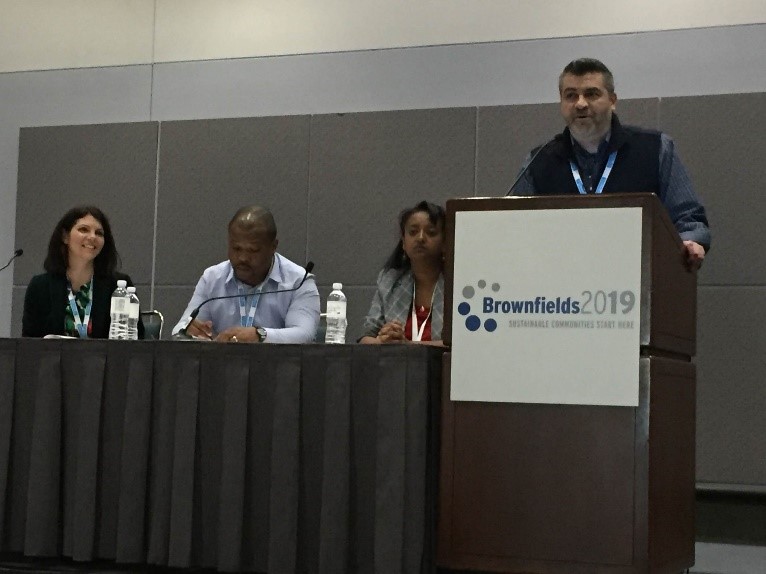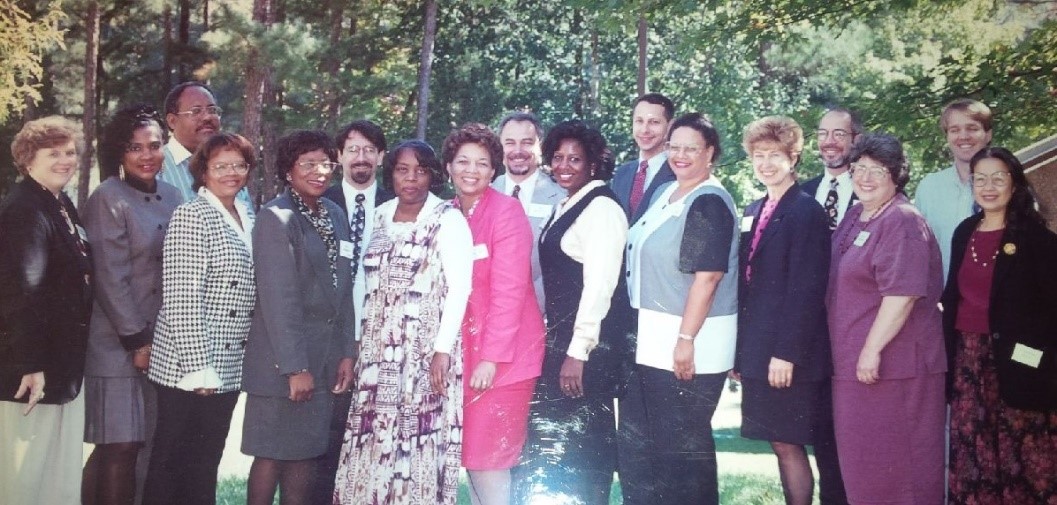A Message from the NIEHS Environmental Career Worker Training Program Director
Sharon D. Beard, NIEHS Worker Training Program

Beard (second row, far right) poses for a group photo with JobTrain program participants in East Palo Alto, California. Also pictured are WTP Director Chip Hughes (second row, third from left) and WTP Public Health Educator Demia Wright (second row, far left). (Photo courtesy of Sharon Beard, WTP)
Since coming to NIEHS 26 years ago, I have taken my role as a public servant and steward of government funds seriously and have worked diligently to improve the health and safety of workers and communities.
In 1993, I started working with low income workers and communities as part of the Dudley Street Neighborhood Initiative in the Roxbury neighborhood of Boston, Massachusetts, while attending Tufts University Graduate School of Engineering. It was here that I truly began to understand the struggles of poverty, environmental justice issues, and disenfranchisement on communities.

Workers helping with cleanup following the Deepwater Horizon Oil Spill. (Photo courtesy of the Deep South Center for Environmental Justice)
As I walked the streets in Roxbury, Dorchester, and Jamaica Plains, I witnessed blighted communities infused with illegal hazardous and solid waste, along with waste transfer stations, brownfields and other abandoned containment properties. It took my breath away to see homes, churches, and schools located next door. I wondered – how could such a wealthy city have neighborhoods this close to downtown with such horrible living conditions and have it be acceptable? It was then that I made a commitment to help address environmental and social justice issues and combat occupational health disparities.
Fortunately, I have since been able to uphold my commitment by helping build and expand the NIEHS Environmental Career Worker Training Program (ECWTP), formerly known as the Minority Worker Training Program (MWTP).
Around 1993, Denny Dobbin, former director of the NIEHS Worker Training Program, emphasized the need for a program focused on stakeholder and community engagement. With the help of other colleagues, federal partners, and community organizations, we held a planning workshop in January 1994 in Cleveland, Ohio. We had to make sure we received input into the process of developing an inclusive request for applications that pulled together best practices and lessons learned from diverse group of stakeholders to give the program a fighting chance.
I took the knowledge and experience from struggles I witnessed in the Massachusetts communities to inform development of the MWTP in 1995. After 25 years, the now ECWTP has reached thousands of underserved workers in more than 40 communities and 20 states, including the District of Columbia. In 2019 alone, ECWTP grantees collectively trained approximately 644 workers, subsequently leading to more than 77% placed in jobs. I am so proud of the sustained efforts of the ECWTP grantees over the years.

E. Mitchell poses for a picture at a 2016 open house to introduce the Carpenters Training Center to the business and industry sector in the Greater New Orleans area. (Photo courtesy of CPWR and the New Orleans Environmental and Construction Pre-Apprenticeship Program)
Many of ECWTP trainees are making significant contributions in their communities. For example, E. Mitchell graduated from CPWR – The Center for Construction Research and Training ECWTP held in New Orleans, Louisiana, in 1998. He was the first trainee to journey out of the Carpenters’ Apprenticeship program. Today, he is still a journeyman carpenter with the Carpenters’ Union. Over the years, he purchased a truck and a home, got married, had three children, and built an addition to his house for his wife’s beauty shop. Mitchell was hired as a council representative with the Central South Carpenters Regional Council in January 2016. He is a longtime member of the CPWR ECWTP Advisory Committee. More about Mitchell’s story was featured in on an alumni page and 2015 press release issued by the New Orleans Environmental and Construction Pre-Apprenticeship Program.

A. Coleman (front) working on a job site. (Photo courtesy of Everett Kilgo, BuildingWorks program manager)
A. Coleman completed the BuildingWorks Apprenticeship program led by the Atlantic Center for Occupational Health and Safety (Atlantic Center) and the New York City District Council of Carpenters Training Center in 2018. Before Coleman enrolled in the program, he was earning minimum wage, had unstable housing, and had previously been incarcerated. He is now a journeyman, and according to a recent BuildingWorks recent survey, he currently earns over $100,000, has purchased a home, and paid for his child’s education. Coleman stated that he is very confident about his financial future and has investments in addition to retirement savings.
There are many other trainee success stories like that of Mitchell and Coleman, and this is what the ECWTP is all about. The success of the program is also strongly validated by findings reported in our 2015 ECWTP Economic Impact Report. Findings showed that the cumulative total value added of the ECWTP was estimated to be $1.79 billion from 1995 through 2013, while the cumulative reduction of government expenditures as a result of ECWTP was estimated to be $717 million. Results also showed that the ECWTP increases the probability of employment for graduates by approximately 59%.
Finally, I would like to acknowledge the contributions of ECWTP grantees and colleagues. This includes longstanding leaders like Tipawan Reed, founder of OAI, Inc. ; Kizetta Vaughn, former training coordinator for the CPWR ECWTP, and Bob Bullard, Ph.D., and Beverly Wright, Ph.D., co-leads of the Historically Black Colleges University Consortium. The ECWTP would not be the successful program it is today without your leadership and tireless efforts to transform the lives of individuals and communities.

Dowling (far left), Semu (third from left), and Surtees (at podium) shared more about ECWTP during a session at the 2019 National Brownfields Training Conference in Los Angeles, California. (Photo courtesy of Sharon Beard, WTP)
I look forward to the continued growth of new ECWTP and community leaders, such as Mollie Dowling and Montgomery Proffitt at OAI, Inc.; Yodit Semu at the Western Region Universities Consortium; and Steve Surtees at CPWR. More about their work and leadership was showcased during the 2019 Joint NIEHS ECWTP/EPA EWDJT Meeting and National Brownfields Conference in Los Angeles, California.
This program continues to change lives. I hope it will continue to reach more trainees and rebuild and clean up communities for a long time to come.

Pictured first row, left to right: Marjorie Piechowski, DePaul Univ.; Beverly Wright, Ph.D., Clark-Atlanta Univ.; Carol Johnson, Clark-Atlanta Univ.; Alice Williams, Jackson State Univ.; Gloria Wade, Alice Hamilton Occupational Health Center; Sandie Crawford, Laborers-AGC; Michelle Depass, NJ/NY Consortium; Laura Luster, Laborers-AGC; Audrey Gotsch, Ph.D., NJ/NY Consortium; Marian Meiselman, Carpenters; Tipawan Reed, DePaul Univ.
Pictured second row, left to right: Sonny Bolls, Ph.D.; Jackson State Univ.; Daniell Kass, NJ/NY Consortium; Bill Bergfeld, Laborers-AGC; Josh Kaeplner, Laborers-AGC; Paul Greenberg, Laborers-AGC; and Brian Christopher, Alice Hamilton Occupational Health Center


